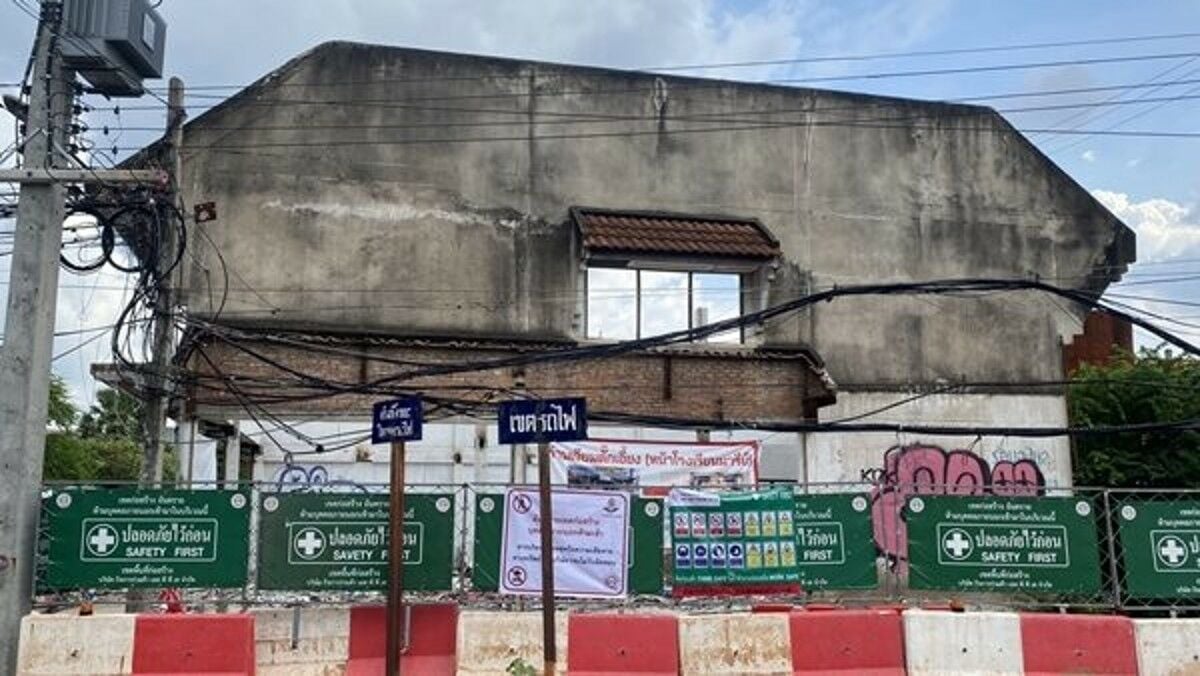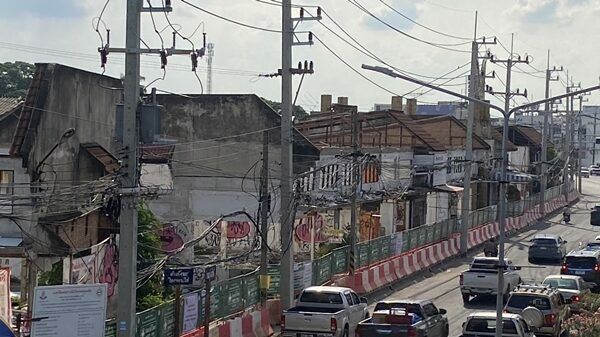Final tenant eviction clears way for SRT high-speed rail project

State Railway of Thailand (SRT) is set to demolish a disputed commercial building after the final tenant was ordered by the court to vacate. This paves the way for the construction of a high-speed rail project that has faced significant delays.
Today, October 9, officials and construction engineers installed barriers and fencing over a 200-metre stretch in front of the commercial building along Mukmontri Road in Nakhon Ratchasima. This marks the beginning of Phase 1 of the high-speed rail project, which will connect Bangkok to Nakhon Ratchasima.
Metal sheet panels, 4 metres high, will be put up to cordon off the construction area and ensure safety for pedestrians and motorists, said an SRT spokesperson.
“The court ruling has finally allowed us to proceed with the demolition and construction without further delay.”
SRT faced challenges due to the prolonged eviction process, which lasted seven months. Initially, tenants were notified to vacate in March. While most complied and moved out gradually, one tenant refused to leave, resulting in a legal battle that stalled the project, said an SRT spokesperson.
“It’s been a lengthy process but we’re now ready to move forward with the high-speed rail project.”
The demolition is crucial for the construction of the high-speed rail station in the area. The delay in evicting tenants hindered the progress of the project, which is a significant part of Thailand’s transport infrastructure development.
This phase, covering sections 3 to 5 from Khok Kruat to Nakhon Ratchasima, is essential to the overall project that aims to enhance connectivity between Bangkok and the northeastern region.
The final tenant’s court-ordered eviction came after prolonged negotiations and legal proceedings. The tenant’s refusal to vacate had caused frustration among local authorities and project managers, as it halted the demolition and subsequent construction activities.
Now that the eviction is complete, the SRT is expediting the demolition of the commercial building to make way for the new station. This phase of the project is expected to bring significant economic benefits to the region, improving travel times and boosting local business opportunities.

The high-speed rail project is part of Thailand’s broader strategy to modernise its rail network and improve regional connectivity. Once completed, the rail line will reduce travel time between Bangkok and Nakhon Ratchasima to just over an hour, compared to the current journey which takes several hours by conventional train.
The SRT is also taking measures to minimise disruption to locals and businesses during the construction phase. The installation of high metal sheet panels is intended to reduce noise and dust, ensuring that the daily lives of those in the vicinity are not unduly affected.
Local businesses have expressed mixed feelings about the project. While some are excited about the potential increase in customer traffic and economic benefits, others are concerned about the immediate impact of the construction work, reported KhaoSod.
“We understand the importance of the project, but the construction phase will be challenging for our business,” said a shop owner near the construction site.
What Other Media Are Saying
- SiamRath reports that the SRT announced plans to demolish the front building of Nakhon Ratchasima train station, progressing with high-speed rail construction projects, emphasizing structural works and land acquisition. (read more)
- LINE News reports on the demolition of a disputed commercial building to facilitate the construction of a high-speed rail project in Nakhon Ratchasima, after the last tenant was evicted by court order. (read more)
Frequently Asked Questions
Here are some common questions asked about this news.
Why is the State Railway of Thailand demolishing the commercial building?
The demolition is needed to construct a high-speed rail station in Nakhon Ratchasima.
What caused the delay in the high-speed rail project?
A legal battle with a tenant who refused to vacate the commercial building delayed the project.
How will the construction affect local businesses and residents?
The SRT is installing barriers to reduce noise and dust, but some businesses are concerned about the disruption.
What are the expected benefits of the high-speed rail project?
The project will reduce travel time between Bangkok and Nakhon Ratchasima and boost local economic opportunities.
What is the current status of the high-speed rail project?
The project has begun Phase 1 with the installation of barriers and the start of demolition work.
Latest Thailand News
Follow The Thaiger on Google News:


























